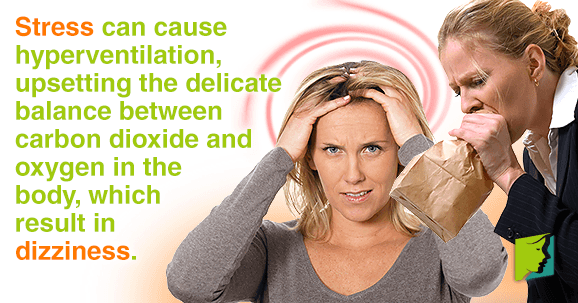Stress and dizziness are both common conditions that have their own sets of causes and symptoms, and are seemingly unrelated. However, there are many people who believe that stress can directly cause dizziness, but is there any scientific evidence to back this up? Read on to discover more about whether or not there is a link between dizziness and stress.
Stress
Stress is a natural part of life, and in moderation, it is actually quite positive. It serves to keep the mind focused on solving the problem at hand, and would have been crucial for survival for an early human who was being confronted by a hungry bear. By temporarily suppressing other systems, such as the immune system, the body is directing all the energy to either fleeing from the problem or working out a strategy to fight it. However, chronic stress is harmful to health, as the stress response has not evolved to be long term, and the chemicals that flood the bloodstream can affect health if they are there for too long.
Dizziness
Dizziness means a person feels lightheaded or unbalanced and can sometimes cause fainting. Dizziness itself is not a disease, but rather, it is a symptom of other things. It generally affects the sensory organs behind the eyes and ears. Many people will experience occasional dizziness as a result of standing up too quickly, drinking too much alcohol, or being too hot, but others can experience it quite regularly, and this can sometimes be dangerous, such as when the person is driving.
The causes of dizziness are many, a few of which are:
- A sudden drop in blood pressure
- Decrease in blood volume
- Neurological conditions
- Side effect from medications
- Anxiety disorders
- Anemia
- Dehydration
- Heat stroke
The Link
Stress can cause hyperventilation, and this means too much oxygen is being inhaled, upsetting the delicate balance between carbon dioxide and oxygen in the body. The change of carbon dioxide levels in the blood can cause dizziness.
When the stress response is activated, stress hormones are secreted into the bloodstream, and they bring about certain physiological and psychological symptoms that boost the body's ability to deal with the threat. Unfortunately, this means redirecting blood to parts that are vital for survival and away from those that aren't. For this reason, lack of blood in certain areas can cause the person to feel lightheaded.
A stressed body can become overtired, and fatigue can ensue. As dizziness is a common response to overtiredness, it makes sense that the body would react to stress in this way.
Although stress doesn't always cause dizziness, and dizziness isn't always caused by stress, there is nevertheless a strong link between the two. The important thing is to keep a check on both conditions and seek medical help if either become too chronic or severe, especially if they are accompanied by other symptoms.
As said above you may face other symptoms, learn more about how to identify them.
Sources
- Anxiety and Depression Association of America. (2014). Tips to Manage Stress and Anxiety. Retrieved November 13, 2014, from http://www.adaa.org/tips-manage-anxiety-and-stress
- Anxiety Centre. (2014). Anxiety dizziness symptom description. Retrieved November 13, 2014, from http://www.anxietycentre.com/anxiety-symptoms/dizziness.shtml
- National Institutes of Health. (2012). Stress and anxiety. Retrieved November 13, 2014, from http://www.nlm.nih.gov/medlineplus/ency/article/003211.htm




